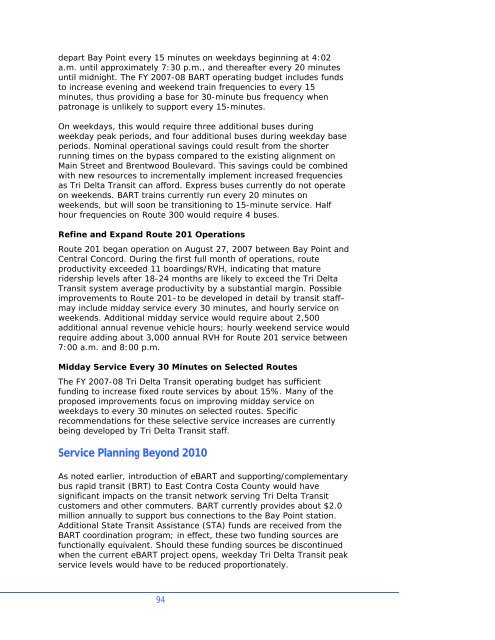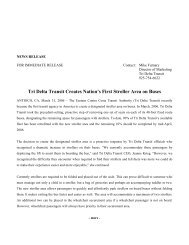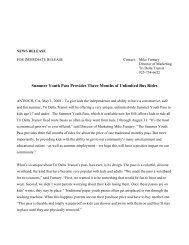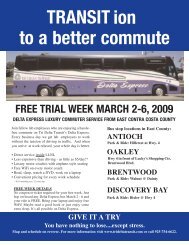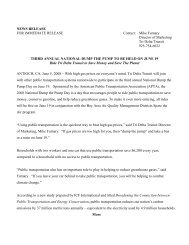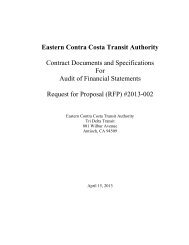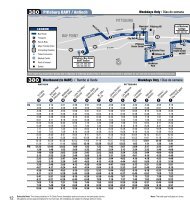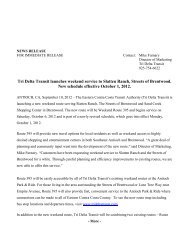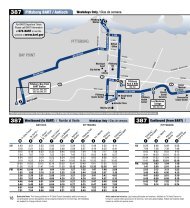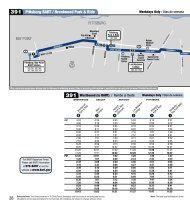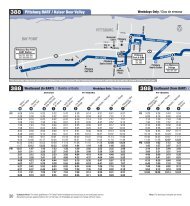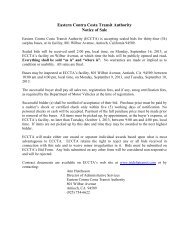to view Short Range Transit Plan FY 2007/2008 - Tri Delta Transit
to view Short Range Transit Plan FY 2007/2008 - Tri Delta Transit
to view Short Range Transit Plan FY 2007/2008 - Tri Delta Transit
Create successful ePaper yourself
Turn your PDF publications into a flip-book with our unique Google optimized e-Paper software.
depart Bay Point every 15 minutes on weekdays beginning at 4:02a.m. until approximately 7:30 p.m., and thereafter every 20 minutesuntil midnight. The <strong>FY</strong> <strong>2007</strong>-08 BART operating budget includes funds<strong>to</strong> increase evening and weekend train frequencies <strong>to</strong> every 15minutes, thus providing a base for 30-minute bus frequency whenpatronage is unlikely <strong>to</strong> support every 15-minutes.On weekdays, this would require three additional buses duringwe ekday peak periods, and four additional buses during weekday baseperiods. Nominal operational savings could result from the shorterrunning times on the bypass compared <strong>to</strong> the existing alignment onMain Street and Brentwood Boulevard. This savings could be combinedwith new resources <strong>to</strong> incrementally implement increased frequenciesas <strong>Tri</strong> <strong>Delta</strong> <strong>Transit</strong> can afford. Express buses currently do not operateon weekends. BART trains currently run every 20 minutes onweekends, but will soon be transitioning <strong>to</strong> 15-minute service. Halfhour frequencies on Route 300 would require 4 buses.Refine and Expand Route 201 OperationsRoute 201 began operation on August 27, <strong>2007</strong> between Bay Point andCentral Concord. During the first full month of operations, routeproductivity exceeded 11 boardings/RVH, indicating that matureridership levels after 18-24 months are likely <strong>to</strong> exceed the <strong>Tri</strong> <strong>Delta</strong><strong>Transit</strong> system average productivity by a substantial margin. Possibleimprovements <strong>to</strong> Route 201–<strong>to</strong> be developed in detail by transit staff–may include midday service every 30 minutes, and hourly service onweekends. Additional midday service would require about 2,500additional annual revenue vehicle hours; hourly weekend service wouldrequire adding about 3,000 annual RVH for Route 201 service between7:00 a.m. and 8:00 p.m.Midday Service Every 30 Minutes on Selected RoutesThe <strong>FY</strong> <strong>2007</strong>-08 <strong>Tri</strong> <strong>Delta</strong> <strong>Transit</strong> operating budget has sufficientfunding <strong>to</strong> increase fixed route services by about 15%. Many of theproposed improvements focus on improving midday service onweekdays <strong>to</strong> every 30 minutes on selected routes. Specificrecommendations for these selective service increases are currentlybeing developed by <strong>Tri</strong> <strong>Delta</strong> <strong>Transit</strong> staff.Service <strong>Plan</strong>ning Beyond 2010As noted earlier, introduction of eBART and supporting/complementarybus rapid transit (BRT) <strong>to</strong> East Contra Costa County would havesignificant impacts on the transit network serving <strong>Tri</strong> <strong>Delta</strong> <strong>Transit</strong>cus<strong>to</strong>mers and other commuters. BART currently provides about $2.0million annually <strong>to</strong> support bus connections <strong>to</strong> the Bay Point station.Additional State <strong>Transit</strong> Assistance (STA) funds are received from theBART coordination program; in effect, these two funding sources arefunctionally equivalent. Should these funding sources be discontinuedwhen the current eBART project opens, weekday <strong>Tri</strong> <strong>Delta</strong> <strong>Transit</strong> peakservice levels would have <strong>to</strong> be reduced proportionately.94


